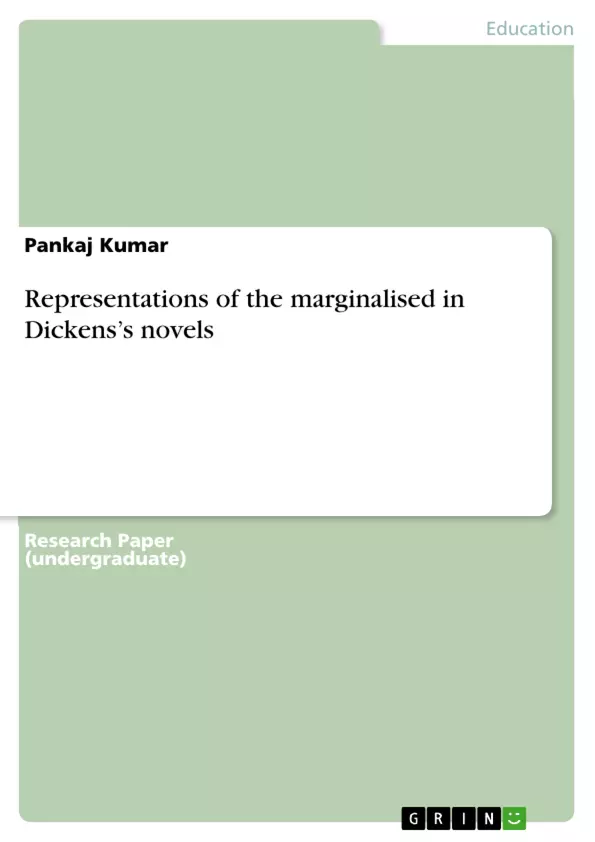This paper will examine Charles Dickens’ depiction of the marginalised in the Victorian society namely in his three selected text; The old curiosity shop, Oliver Twist and David Copperfield. It will mainly deal with homelessness, heroism and forms of unemployment with a focus on The Poor Law. I will look into the problem of poverty in context of first phase of industrialization which brought radical insecurity to more working class than middle class people. Dickens’ novels expose the slums and dirt of London and its surroundings by realistically depicting the corruption of its society. Thus the Industrial Revolution evoked sympathy and a desire for social change in Charles Dickens.
Inhaltsverzeichnis (Table of Contents)
- Representations of the Marginalised in Dickens's Novels
- Introduction
- The Old Curiosity Shop
- Nell and the Challenge of Homelessness
- Family and Poverty in the Victorian Era
- Oliver Twist
- The Poor Law and its Impact
- Oliver's Struggle for Survival
- A Search for Identity and Justice
Zielsetzung und Themenschwerpunkte (Objectives and Key Themes)
This paper analyzes Charles Dickens' portrayal of marginalized individuals in Victorian society, specifically through his novels The Old Curiosity Shop, Oliver Twist, and David Copperfield. It examines the themes of homelessness, heroism, and unemployment, with a focus on the impact of the Poor Law. The paper aims to understand the effects of poverty on individuals, particularly in the context of the early Industrial Revolution.
- The impact of the Industrial Revolution on the lives of the poor
- The role of the Poor Law in shaping the lives of the marginalized
- The experience of homelessness and poverty in Dickens' novels
- The nature of heroism and resilience in the face of adversity
- The social and moral issues of Victorian England
Zusammenfassung der Kapitel (Chapter Summaries)
The paper examines Charles Dickens' depictions of the marginalized in Victorian society through three of his novels: The Old Curiosity Shop, Oliver Twist, and David Copperfield. The analysis focuses on the themes of homelessness, heroism, and unemployment, particularly within the context of the Poor Law.
The section on The Old Curiosity Shop delves into the life of Nell, a young girl who experiences homelessness after being forced to flee London with her grandfather. The chapter examines Nell's resilience and compassion, highlighting the difficulties faced by the poor in Victorian England. It also explores themes of family and the importance of community support.
The section on Oliver Twist explores the impact of the Poor Law on the lives of the marginalized, focusing on Oliver's struggle for survival within the workhouse system and his encounters with crime and poverty in London. It analyzes Oliver's resilience and the search for identity and justice in a society characterized by inequality and injustice.
Schlüsselwörter (Keywords)
The primary keywords and focus topics of this work include: Charles Dickens, Victorian England, the marginalized, homelessness, heroism, unemployment, the Poor Law, Industrial Revolution, poverty, social justice, The Old Curiosity Shop, Oliver Twist, David Copperfield.
Frequently Asked Questions
How does Charles Dickens represent the marginalized in his novels?
Dickens uses realistic depictions of slums and corruption to highlight the lives of the poor, focusing on themes like homelessness, heroism, and the struggle for survival.
What was the impact of the Poor Law in Dickens' works?
The Poor Law is a central focus, especially in 'Oliver Twist', showing how the workhouse system and legal structures often oppressed rather than helped the marginalized.
Which Dickens novels are analyzed in this paper?
The analysis focuses on 'The Old Curiosity Shop', 'Oliver Twist', and 'David Copperfield'.
What role does the Industrial Revolution play in these stories?
The Industrial Revolution is depicted as a source of radical insecurity for the working class, evoking Dickens' sympathy and desire for social change.
How is heroism defined for marginalized characters like Nell or Oliver?
Heroism is portrayed as resilience, compassion, and the search for identity and justice despite overwhelming poverty and social neglect.
- Quote paper
- Pankaj Kumar (Author), 2013, Representations of the marginalised in Dickens’s novels, Munich, GRIN Verlag, https://www.grin.com/document/287722



